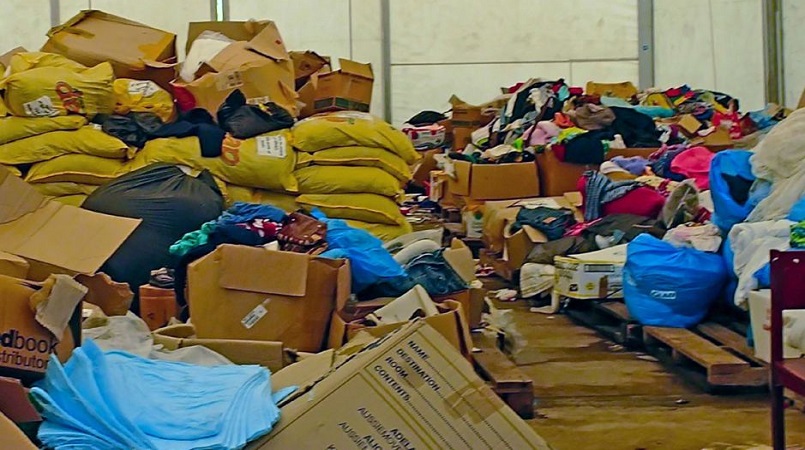
Unsolicited donations given to Australia's Pacific neighbours after disasters may be causing more harm than good, says a report commissioned by the Australian Red Cross.
Aid agencies have issued a firm plea to Australians who donate goods to people in disaster zones to avoid sending unrequested items, saying they will likely end up in landfill.
They said the best way to help people in disaster-struck zones was to instead send money.
The report is the first piece of research examining the often huge financial burden of disposing unrequested goods sent by well-meaning Australians.
Joanna Pradela, the Australian Council for International Development's (ACFID) head of policy and advocacy, said Australians were "extremely generous" whenever a disaster occurred.
"They often want to help communities who have been affected in any way that they can," she said.
The report found that after Cyclone Pam in 2015, Australians sent more than 70 shipping containers of goods to Vanuatu.
They included items like high heels, handbags, heavy blankets and canned food.
But almost a year after the cyclone, 18 of those containers remained uncollected.
Ms Pradela said the cost was almost $2 million in storage fees, and more than half of the canned food had expired.
Chainsaws and woolly jumpers sent to Fiji
After Cyclone Winston, the Australian Red Cross reported having sports gear, chainsaws, carpets and woolly jumpers clogging up Fiji's airports and docks.
If donated items are addressed to an aid agency, humanitarian relief workers who are meant to be providing humanitarian help will be forced to sort through shipping containers of unnecessary donations.
"They have to go through everything, sort and separate the items. Often you have food and clothing thrown in altogether," Ms Pradela said.
"So when you factor in shipping fees, storage, warehousing and distribution costs, it's likely that the costs are far exceeding the value of these goods."
Usually the costs of dealing with unsolicited donations falls on local governments that are already dealing with an expensive disaster recovery effort.
"Very few Pacific Island countries have the resources to deal with the influx of things that arrive on their shores."
'Cash is best'
Aid agencies say the best thing Australians can do to help people recovering from a humanitarian disaster was to donate money.
"When people give cash, aid agencies can help in the most effective way — whether by providing tarpaulins in bulk or giving families cash to buy what they need from local markets," said Steve Ray, the Australian Red Cross disaster and crisis response manager.
